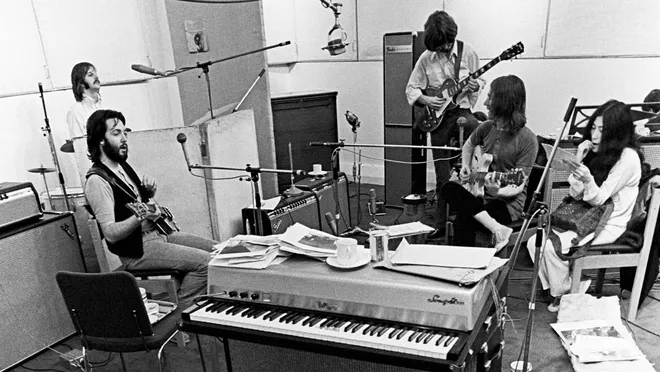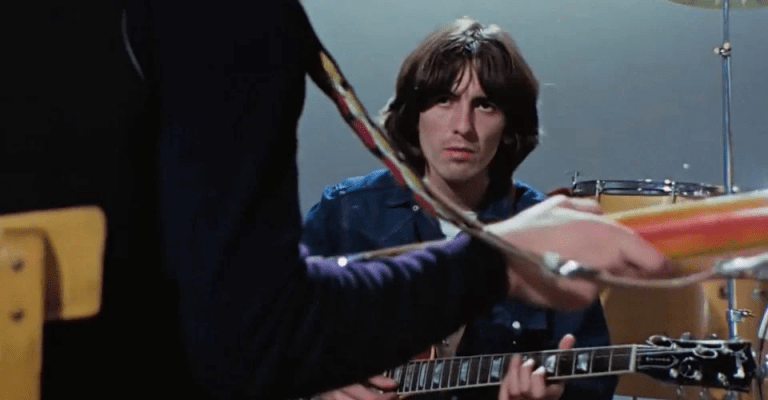Like many folks, I watched watching Peter Jackson’s “The Beatles: Get Back” on Disney+ over the long Thanksgiving weekend. I didn’t have much to do since I was nursing a spouse with COVID and remained isolated from friends and family for safety. John, Paul, George, and Ringo happily helped me while away the hours.
The Beatles have long been a part of my family’s holiday traditions. For many years, Thanksgiving meant journeying East on I-90 from Cleveland to Buffalo with my parents and sister to spend the holiday at my Uncle Steve and Aunt Kathy’s farm near Lake Ontario. After stuffing ourselves, my parents, aunts, and four uncles would sit around the big table, pull out their guitars and the piano bench, and jam to the Fab Four’s greatest hits. The joke has always been that everyone in our musical family wants to harmonize so badly that no one winds up singing the melody.
My uncles each spent time in and out of bands, with each other, with others. They wrote their own music and staged their own musicals. One uncle even put out an album with his band in the 70s. When their wedding band days were behind them, my uncles turned to delighting my cousins and me with Beatles’ sing-alongs around campfires and dinner tables. Occasionally one of my uncles would intersperse an original composition between Beatles songs. In short, The Beatles’ songwriting influenced my family immeasurably.
That’s partly why it was so mesmerizing for me to see Jackson’s documentary.

The Creative Process
Watching The Beatles create music together was fascinating. Seeing it was so different than hearing them describe it in interviews.
I was struck by how many of their lyrics are actually just made-up placeholders. They generally started with the music first and used filler words and syllables to stand in place for things that came to them later. Sometimes a song is built around a single word or phrase, as seems to be the case with Let it Be, which famously came to Paul one night in a dream.
These guys were absolute melody machines. I was flabbergasted to see Paul arrive on the Twickenham sound stage each morning with a half dozen song ideas. Each of them wound up being classics (i.e. Get Back).
Each songwriter, most demonstrably Paul, had a clear vision for the way they wanted a song to work, from the beat to the fills to the bass and guitar parts, and harmonies. The Beatles’ process was far less collaborative than I had imagined it to be.

Get Back’s Team Dynamics
Besides these glorious glimpses into the band’s creative process, the group dynamics are the most striking part of Get Back. Most of the unhealthy ways The Beatles interacted with each other during these sessions come back to observations from my years working in corporate teams. Among them:
- Every group needs a leader. During filming, The Beatles were clearly still reeling from the loss of their manager Brian Epstein. Paul mentions several times that they need someone to tell them what to do, give them structure, hold them accountable. He wishes they had a repeatable process for their songwriting. He pines for the days when Epstein told them what to wear and when to show up. They seem rudderless. Paul is clearly trying to step into the leader role throughout the sessions, but he’s not very savvy about it. This puts off the other members—most famously, George. In one secretly recorded conversation between John and Paul, John confronts Paul about the George situation, and Paul laments that John isn’t really acting the leader anymore. It’s heartbreaking to see them lose their group cohesion, though their love for one another is still clearly there. The power dynamic is off, and everyone feels it.
- Don’t override quiet voices. The story of Get Back is the story of The Beatles’ unraveling. Though they put out music after its filming, the documentary demonstrates the fissures that ultimately led to the band’s break-up. Besides John pulling his focus towards his marriage and, uh, other interests, George is wrestling with his place in the band. It’s painful to watch him be sidelined, to have his ideas marginalized, to be talked over. At times Paul and John tease and even bully him, despite lifting him up when he expresses feelings of inadequacy as compared to Clapton. George proved himself a genius songwriter and musician in his solo career, so it’s all the more painful to watch his contributions to the group be dismissed.
- Even the most talented people experience self-doubt. The Beatles are widely regarded as being the greatest popular musicians in history, so it’s hard to imagine they could ever doubt their own talents. But Get Back includes moments of self-doubt for each. John talks about his voice not being up to the more rocking numbers, George wishes he could play more like Clapton, Paul tinkers like a tortured perfectionist. For his part, Ringo appears to be a journeyman drummer: He’s present, accounted for, and ready to do his part in a supporting role. This self-doubt is remarkable given the pedestals we place these men on. Even the best of us occasionally believe we’re not enough.
- Sadly, women will always be cast as the villain. Yoko Ono, maligned for 50 years as the reason The Beatles broke up, is a constant presence throughout the Get Back sessions. She sits quietly, supportively, nibbling her toast, reading the newspaper, laughing at Paul’s jokes, and chatting affably with Linda Eastman. There is some discussion about how she’s always around and that seems to irk Paul, but he gives her credit for ensuring that John shows up for the sessions. (We know that John was self-medicating pretty heavily at this point.) In one scene, Ono wails avant-gardedly while John gleefully accompanies with some distorted guitar support and proclaims that the track should be on the album. He’s inspired by her. Linda Eastman takes photos throughout as well, later used in band anthologies and indeed in many of the promotional pieces for the documentary. The takeaway? Blaming a woman is usually easier than holding men accountable for their decisions and actions, but do not ever underestimate the value that women bring to the creative process just by being in the room.
I and countless other Beatles fans are grateful for Paul McCartney, Ringo Starr, Olivia Harrison, and Yoko Ono for agreeing to let Jackson make this documentary. These are human beings doing what human beings are compelled to do—create. Perhaps it’s not always flattering, but it feels like truth. And I do believe at least one of The Beatles asked for that. What a gift.
Did you watch The Beatles: Get Back? What did you notice?
